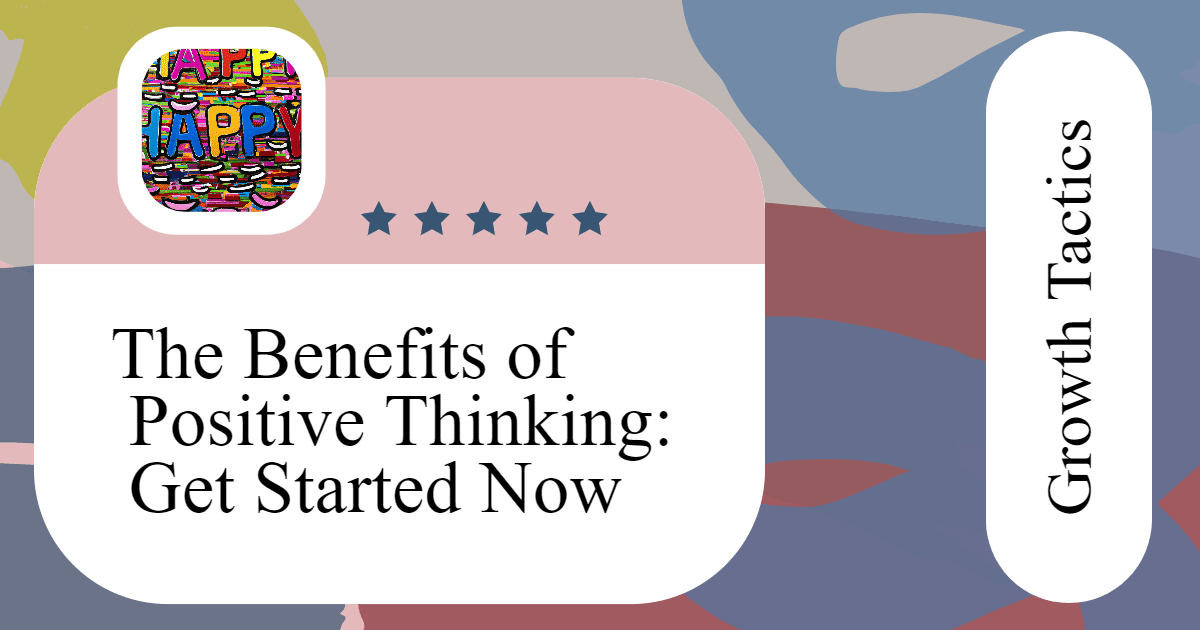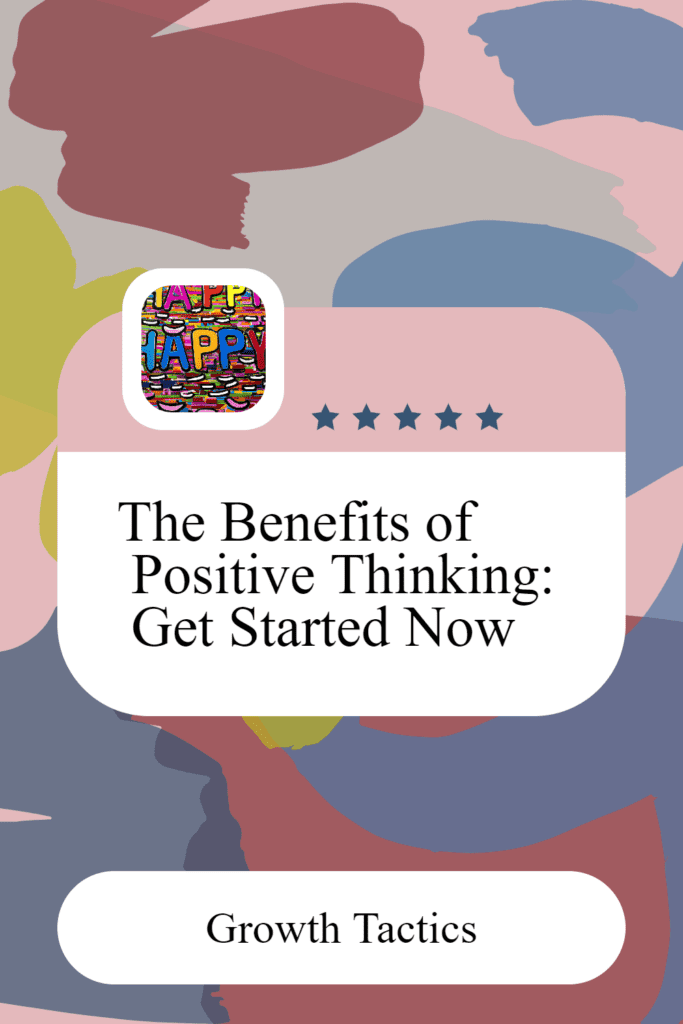The benefits of positive thinking are immense. It can help you to become more successful, increase your happiness, and live a healthier life. Positive thinking has been proven to reduce stress and improve physical health. Additionally, it can boost creativity and productivity, as well as lead to better relationships with family and friends. All of these benefits make positive thinking an invaluable tool for leading a fulfilling life.
If you’re looking to reap the rewards that come from positive thinking, now is the perfect time to get started. With the right attitude and mindset, it’s possible to tap into the power of positive thinking in just a few simple steps.
From changing your thoughts to actively engaging in activities that promote positivity, there are many strategies you can adopt today that will have a lasting impact on your life. Read on to learn more about the amazing benefits of positive thinking and how you can start implementing it into your daily routine right away!
Jump To Section
What does positive thinking mean?
When we think positively, we are focusing on our good qualities and the opportunities that lay ahead. This type of thinking can lead to a more positive outlook toward life, which in turn can result in increased happiness, productivity, and success.
Positive thinking can be used to alleviate stressful situations and ward off negative thoughts. However, it is important to remember that positive thinking does not mean that all problems or setbacks will magically disappear. Instead, it is important to maintain a healthy balance between positive and negative thinking so that we don’t become consumed by our worries.
A positive mindset is a valuable asset in any difficult situation. It can help us approach difficult challenges with a sense of detachment and flexibility. The key is to keep our thoughts consistent and constructive; anything else will only lead to further anxiety and stress.
Benefits of Positive Thinking

Increased resilience
There is evidence to suggest that maintaining a positive attitude can increase one’s resilience in the face of difficult challenges. In fact, several studies have shown that people with a positive outlook are less likely to suffer from feelings of depression or anxiety. They are also more likely to bounce back from setbacks.
This is perhaps because positive people have a greater sense of control over their lives and view adversity as a challenge rather than a threat. They are also more likely to have healthy social relationships which can provide support and advice during difficult times.
Decreased stress and anxiety
When we have positive thoughts, it can help decrease our stress and anxiety. It is important to keep a positive outlook on life, whether it be at work or in our personal lives. When we have good thoughts, we can recharge and be more productive. This can benefit us both directly and indirectly.
Healthier relationships
Those with a positive outlook would have stronger, more fulfilling relationships. Optimistic people tend to have higher self-esteem and are more resilient in the face of adversity. These qualities make them better communicators, problem-solvers, and team players.
In turn, these strengths spill over into their relationships. People who maintain an optimistic outlook tend to be happier and healthier than people who don’t. They also report high levels of relationship satisfaction. This is likely because they’re able to identify and address problems early, build a strong support network, and have realistic expectations for their relationships.
More happiness
Happiness is an elusive state of mind, but it can be achieved by being a positive thinker; focusing on good memories, making time for friends and family, appreciating the nature around you, doing physical activities, and taking on challenges as they come. Positive thinking is key to cultivating more happiness in your life. By challenging yourself to look at situations from a different perspective, you can begin to frame your thoughts in a way that promotes positivity and can eventually
Fewer health problems
Maintaining a positive attitude is key to having a healthy lifestyle. Having an optimistic outlook on life has proven time and time again to provide immense health benefits, both mentally and physically. Optimism can help reduce the risk of developing various health problems, such as high blood pressure, depression, fatigue, heart attacks, strokes, and cancer.
When you can stay hopeful and maintain a healthy level of optimism in your life, you may be able to ward off illnesses before they begin or combat existing ones with greater success. Additionally, studies have found that optimists tend to live longer than pessimists due to the decreased stress levels associated with optimism. So focus on being optimistic, it could just be the key to leading a healthier and happier life with fewer health problems!
Increased productivity
Productivity can be increased in our lives if we stay positive and maintain a good attitude. If we accept challenges, find solutions to problems, and have an optimistic outlook, then our productivity will increase. It is important to remind yourself what you are capable of accomplishing and focus on the end goal rather than the challenges that may stand in your way.
Working while remaining motivated will ensure that tasks are completed efficiently and in a timely manner. Taking breaks when needed, setting achievable goals, and celebrating successes along the way can all help to fuel motivation and keep us feeling positive throughout the process. Staying positive is key to increasing productivity both mentally and physically, as it will help us reach our goals more quickly with fewer setbacks.
How Positive Thinking Benefits Your Career and Workplace Performance
Hey there! Have you ever wondered how positive thinking can boost your career and workplace performance? Well, you’re in for a treat! In this blog section, we’ll explore why staying positive can make a world of difference and help you succeed at work.
Boosts Confidence and Motivation
Ever notice how some people walk into the office with a smile and a can-do attitude? That’s the power of positive thinking! When you have a positive outlook, you naturally boost your confidence and motivation. You start believing in your abilities more, and that makes tackling tasks and challenges a whole lot easier.
Improves Problem-Solving Skills
Here’s a fun fact: positive thinkers are better problem solvers. When you approach issues with a positive mindset, you’re more likely to look for solutions rather than dwelling on problems. This means you become a go-to person for resolving conflicts or overcoming obstacles. Your colleagues and bosses will appreciate that!
Enhances Team Collaboration
Positive vibes are contagious! When you bring a positive attitude to team meetings and projects, your energy can uplift the entire group. This creates a more collaborative and pleasant work environment. People are more open to sharing ideas and giving feedback when they’re surrounded by positivity.
Reduces Stress and Boosts Mental Health
Work can be stressful, we all know that. But a positive mindset can help you manage stress better. Staying positive reduces anxiety and helps you focus on what can be done rather than what’s going wrong. This keeps your mental health in check, making you a more balanced and resilient worker.
Enhances Career Growth
Last but not least, a positive mindset can accelerate your career growth. Managers and leaders often notice and promote employees who display optimism and enthusiasm. Your positive energy not only sets you apart but also opens doors to new opportunities and career advancements.
Building an optimistic mindset
Practicing positive thinking every day
Practicing positive thinking every day can drastically improve our mental and emotional well-being. It helps us to stay grounded and focused, even when we’re going through difficult times.
We can practice positive thinking by consciously choosing uplifting words, speaking kindly; avoiding negative self-talk, and spending quality time with those we love. Additionally, writing down or expressing gratitude for the blessings in our lives significantly impacts our outlook in a positive way. All together, these practices help us to build resilience and develop healthier coping strategies that can be used throughout life’s journey.
Be grateful
Gratitude is an attitude that appreciates life and the blessings we receive. It’s space in our hearts to recognize all that we have and find joy in each moment. Being grateful makes us happier, more satisfied with our lives, and more connected to others.
Expressing gratitude can also help strengthen relationships as it encourages us to be thankful for those around us who bring us love and support. Gratitude allows us to pause and reflect on how far we have come, rather than fixating on what we lack. We can use this powerful emotion to express our feelings of thankfulness for both big and small moments in our day-to-day lives. When we start appreciating what we have and being thankful for the people around us, it snowballs into a beautiful and positive way of living.
Get more sleep
Getting more sleep is essential for both physical and mental health. Sleep deprivation can lead to negative emotions, such as increased stress and anxiety, and feeling overwhelmed or unmotivated. When our bodies don’t get enough rest, hormones become unbalanced and this can lead to emotional instability that has long-term effects on your overall well-being.
Research shows that a good night’s sleep helps regulate moods and improves cognitive functioning, leaving us better equipped to handle life’s challenges. Building a sleep routine should become part of your daily regimen; winding down before bedtime and establishing a consistent bedtime are key to getting the quality rest you need. If you struggle with insomnia, talk to your doctor about ways that could help you get more sound sleep.
Focus on what you can control
Focus on what you can control. No matter how many external factors are out of your power, it’s important to remember that you can influence certain aspects of your experience. Instead of worrying about all the unknowns in life, try focusing on the positives and take joy in small victories throughout each day.
You might not be able to control what happens, but your attitude and perspective can go a long way in helping you feel better about the situation. Find things that bring you joy and focus on them, rather than obsessing over the few things that cause you stress or fear. Even if it doesn’t always feel like it, having control over our thoughts and behaviors can be empowering.
Don’t be afraid to try new things
It can be daunting to think about taking on a new challenge or trying something unfamiliar but don’t let fear stop you from exploring life’s opportunities. Trying new things is a key component of living an enriching life and is supported by the principles of positive psychology. Taking on new experiences has been found to increase self-worth and confidence by showing you that you can push beyond what you thought were your limits and grow as an individual. Don’t give in to worry. Instead, face it head-on with courage and strength.
Practice mindfulness
Mindfulness is a practice that can help us to become more present and aware of our thoughts, feelings, and actions. It involves paying attention to the present moment with an open and accepting attitude. Mindfulness helps us to focus on what is happening right now instead of worrying about the future or regretting the past, allowing us to be fully engaged in what we are doing.
It also helps us become aware of our physical sensations, emotions, and thinking patterns without judging them. By cultivating awareness through mindfulness practices, we can learn how to better cope with difficult emotions and gain clarity on decisions rather than reacting unconsciously out of habit. Practicing mindfulness allows us to appreciate life’s pleasures as they arise instead of always rushing ahead in search of the next experience.
Foster a growth mindset
Fostering a growth mindset is an important step in becoming successful. It involves having the belief that talent and intelligence are malleable qualities, which can be developed over time through effort and hard work. People with this mindset tend to think positively and focus on what they can do to achieve their goals regardless of the obstacles they face along the way.
They understand that setbacks are normal and that mistakes form an essential part of learning and growing. These people embrace challenges as opportunities to learn something new, and they strive to be better each day while setting realistic goals for themselves. By maintaining a positive attitude, they create an environment conducive to success and personal growth.
Surround yourself with positive people
Surrounding yourself with positive people is a great way to think more positively and stay motivated. Positive people influence us in many ways, from their outlook on life to their daily habits. It’s important to choose those around you carefully, as these are the people who will help you reach your goals and fulfill your dreams.
They offer encouragement, inspiration, and motivation when you need it most. Good relationships provide support and assurance in times of difficulty, so it’s essential to surround yourself with friends and family who accept you for who you are and are willing to lift you up when necessary. Ultimately, positive people bring out the best in us, helping us learn and grow into better versions of ourselves.
Find the good in the world
When life gets challenging, it can be difficult to find the bright side. Focusing on negative news and circumstances around us can often overwhelm us and make us forget about the good in the world. It’s important to take a step back and recognize how much of a difference small acts of kindness can make.
Even in difficult times, people are finding new ways to help each other out and keep their spirits high. Let’s focus on that: the love, kindness, support, and community that’s being shared around us. no matter where we go or who we interact with. We are always surrounded by the promise of brighter days ahead if we all strive for change together.
Practice positive affirmations
Practicing positive affirmations is an excellent way to start any day. It’s an easy and effective tool for shifting your mindset that can produce amazing results. Taking a few moments each morning to focus on positive thoughts can help foster positive feelings throughout the day.
These affirmations can be as simple or complex as you like. Anything from thanking yourself for being there and doing the best you can, to believing in yourself and your ability to achieve your goals. Doing this consistently will help you develop a more balanced attitude in all aspects of life, which can lead to more fulfilling relationships, success at work, improved financial security, and greater happiness overall.
Smile more
Smiling is a powerful and simple way to change how you feel and your energy in any situation. It has the power to make people around you feel positive, warm, and relaxed. Smiling can improve your mood, reduce stress levels, brighten up the room, and even increase self-confidence.
Even when we don’t feel like it, forcing ourselves to smile often allows us to trick our brains into feeling more positive emotions such as joy or contentment. While naturally radiating smiles are attractive, you don’t need to have a gorgeous grin to benefit from smiling more, practice makes perfect! Increasing your smile frequency will lead to a long-term boost in both emotional well-being and overall wellness.
Start a gratitude journal
Starting a gratitude journal is a great way to foster resilience and focus on the positive experiences in your life. Writing down things that you are grateful for can help shift your outlook from negative or neutral to positive, creating more optimism and helping you appreciate what you have. Gratitude journals also serve as a reminder of all the good things happening around us, even if it’s hard to see them at times.
They’re also a great way to document progress over time, as we can go back and look at previous entries for inspiration or simply as proof that we have come such a long way. Each night before bed, jot down at least three things that you are grateful for. Whether it’s a person in your life, something fun you did that day, an accomplishment, or even just simply the fact that another day has passed safely. Taking even five minutes out of our day with this exercise can do wonders in terms of reframing our thoughts and improving our mental well-being.
Practice reframing
Reframing is an effective way to manage negative thoughts, feelings, and emotions. It can be seen as a tool for positive self-talk. Reframing involves looking at a situation from different perspectives and finding the silver lining in difficult circumstances.
The idea is to look at each situation with an open mind and to recognize that there are multiple ways of interpreting it. This allows us to focus on the positive aspects of our experiences instead of dwelling on the negatives. Through reframing, we can use positive self-talk to help us stay focused on what we want to achieve rather than getting bogged down by doubts and worries. With practice, we can learn to shift our mindset and find more optimism in life’s challenges.
| Negative Self-Talk | Positive Self-Talk |
|---|---|
| “I can’t do this.” | “I can handle this challenge.” |
| “I’m not good enough.” | “I am capable and skilled.” |
| “This is too hard.” | “With effort, I can succeed.” |
| “I’ll never get this right.” | “I will learn and improve.” |
| “I’m a failure.” | “I learn from my mistakes.” |
| “Why bother trying?” | “Every effort counts.” |
| “No one likes me here.” | “I will build strong connections.” |
| “I always mess up.” | “Everyone makes mistakes.” |
| “I can’t change.” | “I am open to growth.” |
| “This is impossible.” | “I will find a way.” |
Feel free to print this chart out or keep it handy as a reminder to stay positive!
How to cultivate positive thinking in others
Positive thinking is key to cultivating positivity in others. Encourage them to think positively by giving them positive reinforcement and discouraging negative self-talk. Remind them of their successes and strengths and help them identify ways they can improve on the areas that need it. Connect with positive people and look for ways to be involved in activities that bring out optimism in them.
Acknowledge their negative emotions but also remind them of the benefits of having a positive mindset and using positive self-talk when feeling down. Show them how to stay motivated even during difficult times and provide support when needed. Helping others cultivate a more positive outlook on life will help create a more balanced environment for all involved.
Did you enjoy this article on the benefits of positive thinking? Please share and subscribe below.








